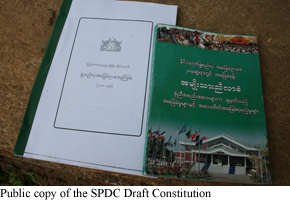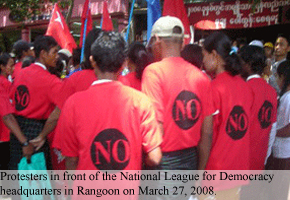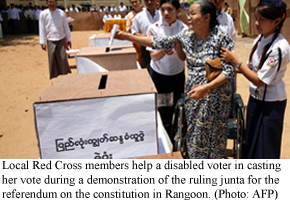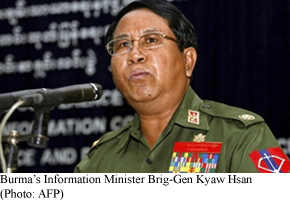Referendum 2008; Burma’s Road to a False Democracy
May 20, 2008
SPDC announce 92.4% approval for the constitution
Introduction
Under 46-years of military rule the people of Burma have had to live with near-constant intimidation and oppression leading to adversity politically, economically and socially. These people live in fear of the government’s intelligence and cannot speak freely. Ethnic minorities are ignored or marginalized by forced relocations and guerilla fighting. People are imprisoned for daring to challenge or question a highly suspicious and edgy government.
From the time they came to power the military government has purportedly been drafting a constitution, as part of their ‘Roadmap to Democracy’. Critics say the draft constitution is step one in the junta’s plan to maintain it’s vice-like grip on power, to enshrine and legitimatize a military dictatorship. Conversely, Burma’s authorities say it is part of a long transition to a civilian government, following the scheduled 2010 election.
Whatever the motive, on May 10th 2008, while most of the country reeled from the devastating effects of Cyclone Nargis 8 days prior, villagers were corralled into polling booths and coerced, sometimes forcibly, into voting yes. The government continued with the referendum in most states and divisions as planned, although delayed voting until May 24th in areas where the disaster destroyed million of houses and thousands of people’s lives, leading some people to suggest that although the junta loves the country, they do not love the people. Instead of helping disaster victims, military officers worked for the referendum campaign to ensure their future power with a majority vote on a document largely unknown and widely misunderstood.
Like others outside Rangoon, many Mon people did not know why a referendum was being held, or what the outcome would mean for them as the junta failed to explain what the draft constitution was, or provide copies for adequate perusal. From the time the new draft constitution was finalized just two months were allowed before the referendum was held on May 10th.
The Constitution
Although it was 14 years in the making, very limited access was provided to the draft constitution. Those who did see it have suggested it is fatally flawed and a prime example of a dictatorship that remains drunk on power while refusing to accept ethnic minorities, and remaining fearful of prominent pro-democracy campaigners including Aung San Su Kyi. The clause forbidding anyone from contesting an election if they are a foreigner’s spouse is a blatant attempt to ensure people’s hero and tireless pro-democracy campaigner Suu Kyi remains out of the picture, given her marriage to Briton (the late) Michael Aris.
 Many Burmese analysts were surprised the military government announced the referendum so soon after completing the draft document, stating that more time was needed for the voters to read copies of the draft constitution and enter the vote with adequate knowledge on what it was they were voting on. As is usually the case in Burma, the junta refused the people’s desires. On a very basic level, many Mon people were unaware what the draft constitution even looked like, as no copies were available for purchase within Mon State. No official distribution took place, with copies only available for purchase from a small number of shops inside Rangoon for four weeks prior to the referendum. At 193 pages long, and with countless convoluted clauses and sub clauses, the constitution does not make for an easy read.
Many Burmese analysts were surprised the military government announced the referendum so soon after completing the draft document, stating that more time was needed for the voters to read copies of the draft constitution and enter the vote with adequate knowledge on what it was they were voting on. As is usually the case in Burma, the junta refused the people’s desires. On a very basic level, many Mon people were unaware what the draft constitution even looked like, as no copies were available for purchase within Mon State. No official distribution took place, with copies only available for purchase from a small number of shops inside Rangoon for four weeks prior to the referendum. At 193 pages long, and with countless convoluted clauses and sub clauses, the constitution does not make for an easy read.
If more time had been allowed to read and properly understand the draft constitution, some of the finer details would result in immediate dismissal; a widespread ‘No’ vote was not an option for the government. So rather than release copies and allow for adequate reading time the junta instead simply explained some of the ‘facts’; the people were led to believe that under the new constitution the military would only take 25 percent of the country’s power, a prospect not so unsavory for the people. A closer inspection of the draft constitution however would reveal that any president-elect must be ex-military personnel with at least having good skills military experience.
The role of the military, in line with the draft constitution, would remain steadfastly rooted in governing the country, with the buck ultimately stopping with the military commander in chief; a democratic society should see ultimate power firmly in the hands of the country’s citizens. The military commander in chief would also hold the power to declare a ‘state of emergency’ at his will and subsequently gain all power – legislative, judicial and executive. The multiple flaws in constitution mean that, basically, the document does not promote democracy.
Referendum Campaign – Moving Further Away from Democracy
With limited information about the constitution available, and the voting date fast approaching, a largely unrivalled propaganda campaign began in earnest in mid-March. At this time and until the referendum, confusion reigned supreme with the junta’s cryptic messages broadcast and plastered across billboards, tea shop walls across the country littered with pro-constitution pamphlets and posters, and people being arrested for discussing the constitution.
The junta deliberately and unashamedly bombarded the people with messages blaming the country’s poverty, lack of democracy and questionable future on the absence of a constitution, going so far as to say a positive vote would equal a step towards democracy and to a real future without poverty. Billboards ran with messages including, ‘To Approve the State Constitution is the National Duty of the Entire People’ and, ‘It is a Duty of Citizens to Ratify the Constitution – Cast ‘Yes’ Vote’. State-run television and radio broadcasting similar messages in the aural form, performed by leading Burmese celebrities.  Full-page advertisements were run in state-run papers, and some private journals were forced to publish the junta’s strong ‘Vote Yes’ propaganda.
Full-page advertisements were run in state-run papers, and some private journals were forced to publish the junta’s strong ‘Vote Yes’ propaganda.
Real democracy needs to allow opposition to the constitution. There was no freedom of assembly, no freedom of the press, nor did the junta release any political prisoners or allow an independent judiciary.
The junta did not allow a public debate during the referendum campaign, only positive discussion for the constitution was permitted. The local media were forbidden from reporting on any attempts at a ‘No’ campaign. In short, the new constitution is not allowed to be criticized, and anyone who attempts to do so may face more than ten years imprisonment. Some who dared recommend a ‘No’ vote were severely beaten before being arrested; more than a hundred young members of Suu Kyi’s Naional League for Democracy (NLD) party were arrested, beaten and imprisoned for wearing T-shirts that said ‘Vote No’. Even so, determined to register an oppositional voice, the NLD launched its campaign in opposition to the constitution, with leaflets stating, ‘For the people who have the right to vote, we would like to encourage again all voters to go to the polling booths and make an ‘x’ mark without fear’.
The junta launched vote campaigns just once per village across Mon State. Although many people were invited to these ‘information nights’, attendees were minimal aside from pro-constitution Union Solidarity and Development (USDA) members. Others who attended were subjected to the type of propaganda rampant throughout the lead up to the referendum. Attendees were told a ‘Yes’ vote was a vote for democracy, while a ‘No’ vote would ensure a poor economic situation for at least 15 years. At no stage were the specifics of the draft constitution discussed.
From the beginning the referendum to vote on the draft constitution was flawed. The voting commission was given full run of the media, launching massive ‘Vote Yes’ campaigns, while the opposition was given no such liberty. Independent election monitors were banned, as were foreign journalists seeking to report on the referendum. Both of these omissions are serious in disestablishing any international credibility. While propaganda was splashed around the streets, a less obvious campaign of intimidation and coercion took place across the country.
In Mon state alone military officers across several divisions threatened public service personnel to vote ‘Yes’. In Balu-gyun public servants were threatened by military agents to vote ‘Yes’ or face dire consequences while in Moulmein nursing school students were told to give a positive vote, and were made to attend the pre-referendum ceremony held on April 22nd in Moulmein. If they failed to attend or refused to vote ‘Yes’, they forfeited their chance to attend their school’s next level.
The intimidation and improper practices continued with pre-voting. In Mon state the junta sent vote boxes to ceasefire and NMSP-controlled areas, with enough ballots for everyone listed on their ID inventories. All votes had to be entered prior to May 10th at which point the ballot boxes were returned to the nearest town, usually Ye or Three Pagodas Pass. Many Mon refugees were wary of this arrangement, largely because their votes were not counted in front of them; some stated that although they opposed their constitution they were unlikely to place a cross in the box.
A New Mon State Party (NMSP) source claimed that in every village of Moulmein the SPDC, town authorities and the military forcefully threatened villagers to vote ‘Yes’ or face 3 years imprisonment or a heavy fine, leaving voters disillusioned and fearful for themselves and their families if they voted with their conscience.
May 10th, 2008
After two months of relentless campaigning, and in the wake of Cyclone Nargis, what was fast becoming a farcical referendum went ahead on May 10th. Transparently dishonest, authorities openly cheated by rigging votes, ballot stuffing and candidly intimidating voters to vote ‘Yes’.
 Case Study:
Case Study:
On the day of the national referendum, May 10th, a polling station in a Southern Ye Township village was threatened by heavily armed military personnel, and at least one villager arrested for unknown reasons. At approximately 11pm in neighboring Kaw Hlaing Village, armed soldiers led by Warrant Officer Myint Than from Light Infantry Battalion (LIB) Number 31 entered the polling station situated at the Basic Education Middle School. Many villagers reported Myint Than had been drinking heavily and appeared drunk as he waved his firearm around.
The manager of voting commission personnel present at the polling booth requested Myint Than remove his soldiers promptly, as staff and voters felt threatened. The manager then sustained a heavy beating in front of his staff and voters, with soldiers using gun butts to his head and back in such a frenzied attack he is still unable to walk.
The manager was held in high regard by the villagers, who saw him as a good leader determined to stand up for their rights. It is believed that Myint Than and his soldiers entered the polling booth with an intent to destroy the contents, as a high ‘No’ vote had reportedly been recorded at the site.
Irregularities and wrongdoings on May 10th were many. Under the junta’s referendum law the final ten people to cast their vote were permitted to remain and observe the vote count. Such observer’s saw military personnel unashamedly changing ‘No’ votes to ‘Yes votes.
According to the referendum laws, the polling stations were to open at 6 am and close at 4 pm. Many polling stations in Mon state did not open on time and closed early; at least 10 polling stations were not opened at 6 am and closed much before 4 pm in Mudon, Thanbyuzayat and Chanug Zone townships, said a leader of the Mon National Democratic Front (MNDF). In other towns across the country some polling stations closed before noon and most before 3 pm. Some observers have suggested the polling stations were closed early after poll station staff were threatened by higher authorities that they would be sacked from their jobs if their polling stations got more ‘No’ votes than ‘Yes’ votes.
In one of the most blatant example of vote-rigging, many people attempted to vote but were told that someone had already voted on their behalf. Other examples of irregular electoral practices saw voting officials telling voters they had no choice but to place a tick in the box, pulling back curtains and watching the ballot be completed, demanding fingerprints be taken with ballots, moving the ballot box and demanding ‘No’ voters use one surrounded by military officials, asking voters to complete their personal information but removing the ballot before they ticked or crossed, placing a tick in the box themselves and handing out ballot papers with an affirmative vote already present.
Results
The Junta is now claiming a 92.4% positive vote following a 99% voter turnout, as declared by the head of the Referendum Holding Committee Chief Justice Aung Toe. Even in fully-functioning democracies a 99% voter turnout is unheard of. These results do not reflect the people’s true wishes for their country, but rather provide a clear example of the authority’s intimidatory tactics and hard-line threats at work.
 The votes from 47 townships across the Irrawaddy Delta and Rangoon division will do little to curtail the overwhelming positive result. For many groups these alleged results come as no surprise given the atmosphere in the lead up to the referendum. Indeed, some critics go further to say that the referendum was a sham, as regardless of the true results the junta were always sure to get the result they sought, or at least announce they did. The NLD has stated the results claimed by the military government are unacceptable, false, and do not accurately reflect the true feelings of the population of Burma.
The votes from 47 townships across the Irrawaddy Delta and Rangoon division will do little to curtail the overwhelming positive result. For many groups these alleged results come as no surprise given the atmosphere in the lead up to the referendum. Indeed, some critics go further to say that the referendum was a sham, as regardless of the true results the junta were always sure to get the result they sought, or at least announce they did. The NLD has stated the results claimed by the military government are unacceptable, false, and do not accurately reflect the true feelings of the population of Burma.
As predicted by many critics and observers, the junta manipulated voting either in the lead up to the referendum, on the day of the vote or during the count itself. Like in 1990 when the results of the election were dismissed, we now face a victory cry loud enough to drown out those in opposition, from humble and brave ‘No’ voting villagers to the international community.
Conclusion
Unfortunately the arrests of opposition activists, media censorship, bans on political meetings and gatherings and various other forms of widespread repression were not confined to the lead up to the referendum; this is how the people of Burma live every day under a military dictatorship.
The junta’s ‘Roadmap to Democracy’ is anything but, and may only result in further deprivation of basic rights to the people of Burma. Real change must occur so any future referendums can be genuine. Despite feeling like potential catalysts for change through voting, most people inside Burma know the real power remains with a junta and it’s cronies, willing to rig any vote so as to retain power.
To try and force a democracy is in itself anti-democratic. It is important the international community does not pay heed to the results of the junta’s latest exercise in authority, and should instead demand real change toward democratic reform inside Burma, and processes that recognize and include all ethnic minorities and all political parties.
Comments
Got something to say?
You must be logged in to post a comment.



















































